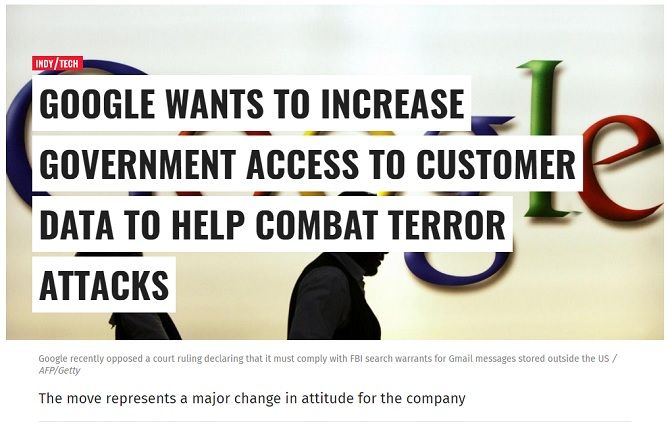You might have heard about Google's intention to give worldwide authorities wider access to the personal details of account holders.
This is supposedly an effort to counter terrorism. Giving secret services better access to everyone's private data means an increased chance of catching terrorists and stopping atrocities.
Or at least that's how it appears.
Because Google is actually helping us by ensuring our data is more secure by overthrowing a decades-old bill.
How's It Being Reported
Google has stuck its head above the parapet, and spoken about data sharing. Naturally, this has resulted in the technology giant receiving considerable grief about privacy policies.
The company urged an update in the storage and sharing of personal information abroad; soon after, it hit the headlines for apparently wanting increased government access to the stuff that should be kept secret. Like so many other policies, this was blamed on the war against terror. That's why bills such as the "Snooper's Charter" are passed. It's why intelligence services like the National Security Agency (NSA) frown at the encryption employed by WhatsApp.
That's largely because it works. The majority of the general public accept some regulation is necessary. Digital Citizens Alliance recently encouraged [PDF]:
"Digital platforms should seek out opportunities to collaborate with law enforcement, cybersecurity experts, consumer protection groups, and civil rights organizations to explore a new approach to protect consumers."
One article on the subject specifically warned that, if Google gets its way, governments would be able to read the personal information of account holders across the globe faster than ever before.
Right now, the process of governments getting a warrant and subsequently requesting data from foreign agencies can take months. If officials do listen to Google's June 2017 statement, it would mean the process of requesting data from overseas would be streamlined by effectively bypassing the need for the middle man (i.e. the U.S. government).
This might be technically true, but is only half the story.
What Actually Happened
Yes, Google appealed to law enforcers to make such processes quicker, which would potentially aid in stopping terror attacks. No, that's not entirely indicative of a laissez-faire attitude to privacy.
Google doesn't want to increase access to data. It just makes it more efficient. What's the point in governments requiring data to intercept suspects if it'll only arrive so long after the event?
Still, the media is largely missing the big story here: Google is actually increasing the security of your private details by calling for better protection worldwide!
At the speech in Washington D.C., Google's senior vice president, Kent Walker, urged the White House to amend outdated telecommunication rules that allow government departments to access details stored on servers in other countries.
The important thing is, he wants only countries committed to baseline privacy, human rights, and due process rules to be able to share private information.
It's actually an effort to make sure your data isn't compromised by anyone with malicious intent. Dictatorial regimes, for example, wouldn't be able to gain access to your information; such baseline standards, argued Walker, would ensure better digital privacy measures around the world.
However, what this would actually entail wasn't specified.
And this isn't just fighting a theoretical issue. Google has been waging a more private battle with the US after its government tried to use the Stored Communications Act to acquire data stored overseas. As the information stored by Google is split across numerous servers, it would affect everyone with an account.
What Regulations Exist Now?
As it stands, data stored in foreign territories can be acquired using a mutual legal assistance treaty (MLAT), which involves a formal request for data followed by the respective authority obtaining a domestic warrant on the behalf of the other country. Google's suggestion would mean warrants are only adhered to in the appropriate conditions.
It's actually been backed up by Amnesty International and Human Rights Watch, in their denouncement of the EU-US Privacy Shield.
This is framework for sharing data between the U.S. and countries in the E.U., but it's far from perfect. In a letter to the European Commission, the two groups noted:
"[T]he United States of America (United States) does not ensure a level of fundamental rights protection regarding the processing of personal data that is essentially equivalent to that guaranteed within the European Union (EU)."
The EU-US Privacy Shield was a replacement to Safe Harbor, intended to stop American surveillance affecting European residents.
Google's proposal would supersede the Privacy Shield, and widen its parameters to all nations intending to collect and collaborate sensitive data on citizens.
What Can You Do?
Much of this is out of our hands, but vocal support for greater privacy protections is a good start, which might mean looking into the folk fighting on your behalf.
Another issue you may find after learning this is simply how much information Google actually has about you. You don't have to use Gmail -- Google has your browsing history! And Incognito Mode doesn't even keep you entirely anonymous.
You could consider not using Google search at all anymore. Ah, but what can you use instead? Secure browsers that don't track you are available, or you might prefer the easy option: DuckDuckGo. The search engine is a private service, so won't keep your browsing history data on file. Your browser will store that data, though, depending on your settings.
As an added bonus, you won't be bombarded with personalized ads. Heck, there are loads of benefits beyond just staying anonymous.
Still, it seems harsh to penalize Google for having the courage to stand up for the rights of users.
Google: A Force for Good?
So, is Google a friend of privacy advocates? Yes... and no.
We must praise any major company that openly fights for the privacy rights of us all. It's no great shock that data sharing between countries is standard and necessary, so this is a positive step.
But that's not to say that Google doesn't frequently give in to requests to share personal information about its users. In the first six months of 2015, for example, Google caved into around 78 percent of the 12,002 requests from U.S. law enforcers -- that is to say, the firm shared data following about 93,600 requests.
Does this give you some peace of mind in Google's ability to keep your details secure? Or the exact opposite? Have you given up on Google after fears for your rights?




